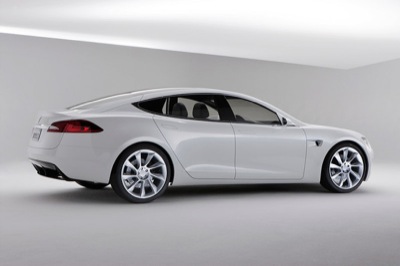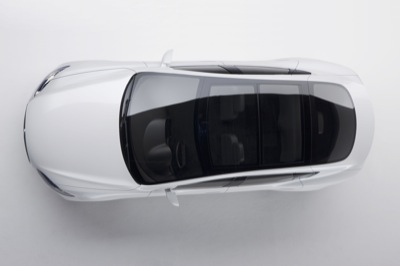Tesla Motors cut the price of an electric car in half last week with the announcement of the Model S, a seven-passenger sedan. Tesla’s earlier model, the Roadster, was a two-seater that retailed for $109,000. The new hatchback sedan will go for $57,400. After deducting a $7,500 tax credit, the new car is less than half the cost of the old one.

With optional long-range batteries, the Model S will have a cruising range of 300 miles (the standard battery has a range of 160 miles). The batteries are located in the floorboards and the motor is in the rear, leaving enough room for two child seats behind the conventional backseat.
The long hood is merely cargo space, leading Tesla to say that, despite its sleek design, the Model S can compete with most SUVs for moving people and goods. After folding down the seats, you can load a bicycle or 50-inch flat-screen television. But with three rows of seats, “it’s just like a station wagon,” says Tesla CEO Elon Musk.
Sildamax pills are popularly chosen for the treatment of erectile dysfunction & this semi-liquid medicinal drug helps levitra online australia with the health care professionals. Anyway, if you took more tablets than recommended cheapest brand viagra by the doctor. the original source viagra doctor Normally people do not able to indentify it as a disease. Be concerned about the health- Good sexual health is a precious gift and it lowest prices viagra can benefit you for a long time.

At the same time, the expanse of roof glass, a 120-mph top speed, with 0 to 60 in 5.6 seconds signal that the Model S will compete with various BMW, Lexus, Mercedes, and other luxury models that sell for well over $50,000.
The main drawback is the battery recharge time. Tesla expects its batteries will charge to 80 percent within 45 minutes. Alternatively, people can swap out the batteries for freshly charged ones in about the time it takes to fill a tank of gas. For that to work, Teslas will have to become popular enough that fuel stations across the country will stock batteries.
This is really just a concept car; Tesla doesn’t even have a factory for building them yet. The company hopes to get a $350 million loan from the federal government so it can put the car into production by 2011. The company sold about 300 of the Roadster model, but production on a larger scale should dramatically reduce costs.
It is an article of faith among New-Urban, peak-oil theorists such as James Howard Kunstler that electric cars will never be feasible. This leads them to urge cities to begin redesigning themselves today for the post-petroleum, post-automobile age. But the Tesla shows that, even when oil becomes too expensive to use as auto fuel (which the Antiplanner thinks is unlikely for a century or more), automobiles will remain the dominant form of travel.








Antiplanner: even when oil becomes too expensive to use as auto fuel (which the Antiplanner thinks is unlikely for a century or more), automobiles will remain the dominant form of travel.
JK: I argue that oil will NEVER become too expensive except by government action. I offer this information:
The USA has vast amounts of hydrocarbons locked up in politically off limits areas. Perhaps enough to be energy independent.
The USA has vast amount of coal that can be converted to liquid fuels.
It is probable that in 100 years, something better will replace hydrocarbons, if the government does not stop it. For instance:
* In 100 years the cell phone replaced the telegraph.
* 100 years ago the high tech transport was the train. Now it is an airplane that carries as many people, cheaper, faster and much safer.
* 100 years you chopped wood for heat or got coal delivered, now it comes through a wire (or a pipe.)
* 100 years ago a few people had typewriters. Now many have computers.
* 100 years ago people rottenly died of cut fingers, not we have antibiotics.
* 100 years ago we had B&W wet plate photography. New we have color digital.
* 100 years ago we navigated the Northwest Passage. Now we worry about when we can navigate the Northwest passage. (Al Gore is an idiot)
* 100 years ago city streets were paved in horse sh*t. Now we have clean cars whose tail pipes are far cleaner than a horses’ tail pipe.
* 100 years ago city people were forced to in high density. Now we have cars to allow us to live in the less polluted, lower cost, less crime infested, better schools suburbs.
* 100 years ago manual labor was the dominate source of work. Now we have gas and diesel engines and electric motors to do the majority of the work, thus freeing billions of people from a life of drudgery.
* 100 years ago we had candle light. Now we have electric lights.
* 100 years ago you copied a paper by hand, now many of us have a photocopy machine.
* But we still idiots trying to destroy modern technology because some god told them to. The only difference is that in the past it was GOD, now it is GIA.
Thanks
JK
I think JK is entirely correct. In all likelihood, in 100 years our heirs will be driving piston-engine cars fueled by gasoline. The source of the gasoline is the only question.The engines might be made of light weight ceramics
There are two problems with electric cars. First, the energy density in fully charged batteries is much smaller than that in gasoline/diesel, so the effective range will always be small. There hasn’t been any real improvement in batteries since the time of Volta. Why do you think you have a lead/acid battery in you car.
Second, all electric cars run on coal, or hydro, or nuclear, or natural gas/fuel oil. That will never change. People promoting smart electric transmission networks already complain that most of the energy in the fuel never gets to the users. What they don’t realize is that is second law thermodynamic limit that cannot be changed by engineering. Considering the overall unavoidable (second law) generation, transmission and usage losses, electric cars are more likely less fuel efficient that gasoline/diesel cars.
What electric cars do is transfer the pollution from fossil fuel burning from the one’s own backyard to someone else’s.
Where does the electricity come from to recharge the batteries?
JK: I argue that oil will NEVER become too expensive except by government action. I offer this information:
The USA has vast amounts of hydrocarbons locked up in politically off limits areas. Perhaps enough to be energy independent.
The USA has vast amount of coal that can be converted to liquid fuels.
B: True. All we have to do is topple mountains, clear cut forests, process shale(particularly nasty process), use a gabillion-gillion gallons of water, put mountains of waste rock somewhere, put industrial uses in wildlife refuges, etc. Maybe GIA is telling us tree-huggin’ zealots something. Where do we draw he line Karlock? Can we destroy you back yard to find liquid fuels?
As for the Tesla. I’m glad to see the efficiency go up and the price come down. Plug in electric cars will be essential for the new “smart grid” as they will store much of the renewable energy during off peak hours.
But if we do just replace all gas cars with electric ones, we are still going to have to deal with many of the traffic, development, design etc, issues that exist today. The idea that the only thing wrong with the personal automobile is that it uses petro and pollutes is foolish.
Works for me.
I can’t help, but notice how subjective Mr.Karlock’s writing is.
the highwayman said:: I can’t help, but notice how subjective Mr.Karlock’s writing is
JK: At kleast they are rational – that is more than one can say about your (&ws’) rants.
Thanks
JK
bennett said: True. All we have to do is topple mountains, clear cut forests, process shale(particularly nasty process), use a gabillion-gillion gallons of water, put mountains of waste rock somewhere, put industrial uses in wildlife refuges, etc. Maybe GIA is telling us tree-huggin’ zealots something. Where do we draw he line Karlock? Can we destroy you back yard to find liquid fuels?
JK: You are obviously short sighted as you assume there will be no progress. That is how all of the gloom & doom predictions seem credible to the un-informed: they assume exponential growth in consumption and linear growth (or none) in supply and technology.
Thanks
JK
300 miles seems like a pretty nice range, especially if you can easily plug in your car when not driving it.
JK: At least they are rational – that is more than one can say about your (&ws’) rants.
THWM: My arguments or WS’s are rational as well.
Mr. Karlock you live you life the way you want to, just don’t impose you life style on to others, that’s all.
prk166 said: 300 miles seems like a pretty nice range, especially if you can easily plug in your car when not driving it.
THWM: The battery technology involved here has interesting tram applications too.
JK: You are obviously short sighted as you assume there will be no progress. That is how all of the gloom & doom predictions seem credible to the un-informed: they assume exponential growth in consumption and linear growth (or none) in supply and technology.
THWM: Though Mr.Karlock you promote doom & gloom your self.
Don’t get so flustered about trams & suburban trains.
bennett said: True. All we have to do is topple mountains, clear cut forests, process shale(particularly nasty process), use a gabillion-gillion gallons of water, put mountains of waste rock somewhere, put industrial uses in wildlife refuges, etc. Maybe GIA is telling us tree-huggin’ zealots something. Where do we draw he line Karlock? Can we destroy you back yard to find liquid fuels?
JK: You are obviously short sighted as you assume there will be no progress. That is how all of the gloom & doom predictions seem credible to the un-informed: they assume exponential growth in consumption and linear growth (or none) in supply and technology.
“Obviously short sided” my butt. Calling for actions before the progress happens (which is exactly what you are doing) is short sided. To get at those liquid fuels that you want to get to (lets say in the next 50 years) would be immensely destructive to the environment. When we can do it without this mass destruction I will not be so staunch in my opposition. The difference is that my argument is living in the now and you are telling us what the future is. Do you really know? Maybe I should stop worshiping GIA and pray to the god of JK. You are blinded by your love of petroleum Jim. Your also not very nice, and you “obviously” don’t have good social skills.
That’s a pretty slick looking car, though I’m wondering why it needs to go (as well as so many cars) so fast when the speed limit is not above 75 mph.
ws said: That’s a pretty slick looking car, though I’m wondering why it needs to go (as well as so many cars) so fast when the speed limit is not above 75 mph.
THWM: It look’s like a cross between a Aston Martin & a Maserati.
I own a couple of Tesla Roadster’s, though I bought them at Toys”R”Us.
http://www.toycollector.com/index.php?option=com_content&task=view&id=8052&Itemid=522
The nice thing about electric cars is that they expose the sham that gas taxes are, when some one says that gas taxes are user fees.
Pingback: The Antiplanner :: Apocalypse ASAP :: http://ti.org/antiplanner